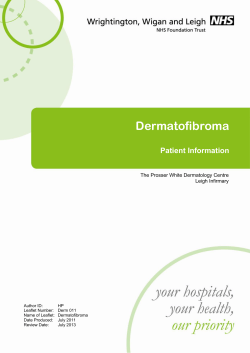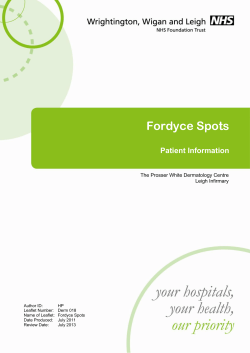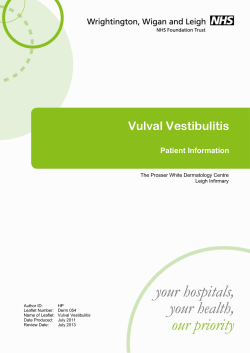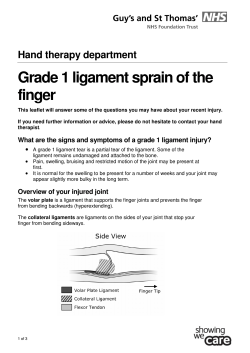
Skin Prick Allergy Testing Specific to Ear, Nose and Throat Patient
Skin Prick Allergy Testing Specific to Ear, Nose and Throat Patient Information Author ID: Leaflet Number: Name of Leaflet: Date Produced: Review Date: JT TLC 019 Skin Prick Allergy Testing Specific to Ears, Nose and Throat October 2012 October 2014 Skin Prick Allergy Testing specific to Ears, Nose and Throat Page 1 of 5 Why do we do skin allergy testing? This gives the medical team information about anything you may be allergic to which can affect your nose and cause difficulty in breathing. Benefits of the test The skin prick test can provide useful evidence for a diagnosis made on clinical grounds. It is a simple, quick and safe method with a high degree of accuracy. Skin prick testing with various routine allergens (pollen, dust mites) is still the procedure in diagnosing allergic symptoms. Risks of the test The risk of having an allergy reaction to a skin prick test is very low due to the small volume inoculated when introduced with the lancet. Alternatives to having the test An alternative to skin prick testing is a blood test – The RAST Test. This may be appropriate in patients who present with a history of sensitivity to particular allergens and yet produce consistently negative allergy tests. What about medication? If you are taking anti-histamines, nasal drops or sprays, these must be stopped three days before having the test as this will affect the outcome of the test. What will happen when I come to clinic? Please book in at the reception desk on Suite 2 at the Thomas Linacre Centre – or Area 1 at Leigh Infirmary. A nurse will call you through and ask you to remove any clothing on your arms, as she will need to do the test on your forearm. Numbered tape will be applied and small drops of various allergens will be put onto your arm. The skin will be pricked with a small instrument allowing the allergen to seep underneath. Excess drops will be removed with a tissue. How long will I have to wait for the test? After the test has been performed you, will be asked to sit back in the waiting room for around 15 to 20 minutes. What will happen after? After 15 to 20 minutes, the nurse will call you back to look at your arm. If there is any reaction an explanation as to what measures can be taken to help will be given. Advice and information sheets will also be given. Before you leave the nurse will check that you have a follow-up appointment made with a doctor. Skin Prick Allergy Testing specific to Ears, Nose and Throat Page 2 of 5 Research Research is undertaken to add to the existing scientific knowledge on a particular subject. There are a number of staff within the Trust who conduct Research studies. It is possible that during the course of your treatment you may be asked to take part in a research study, however, you do have the right to refuse, and this will not affect the care that you receive. Your NHS Number, Keep it Safe Every person registered with the NHS in England and Wales has their own unique NHS Number. It is made up of 10 digits for example 123 456 7890. Everyone needs to use the NHS Number to identify you correctly. It is an important step towards improving the safety of your healthcare. Always bring your NHS number with you to all hospital appointments or quote it if you need to telephone the hospital for any enquires. This will allow staff to check that they have the right patient details by checking this against your NHS number. To improve safety always check your NHS Number on correspondence the NHS sends to you. Ways of finding out your NHS Number If you do not know your NHS number, contact your GP or local Primary Care Trust. You may be asked for proof of your identity, for example a passport or other form of identity this is to protect your privacy. Once you have obtained your NHS Number write it down and Keep it Safe. My NHS Number Information Rights and Access The Trust will keep your information secure and confidential at all times. The Data Protection Act 1998 states that personal and sensitive information must be processed fairly, lawfully and securely. This applies to all information we hold whether on paper or electronically on computer systems. All personal information is processed fairly, lawfully and as transparently as possible so that you: • • • • Understand the reasons for us processing your personal information Give your consent for the disclosure and use of information where necessary Gain trust in the way we handle your information Know that you have the right to request access to personal information we hold about you Information relating to the business of the Trust is available under the Freedom of Information Act 2000. For example, what we spend and what we do. You can find out more by visiting the Trust website or submitting a Freedom of Information request to the Trust for this information. For further information regarding data protection, please read our leaflet called “How we use your personal information”. For Freedom of Information, please read our leaflet called “The Freedom of Information Act and You”. You can also visit the Information Governance pages on the Trust website. Skin Prick Allergy Testing specific to Ears, Nose and Throat Page 3 of 5 Patient Relations The Patient Relations/PALS Department provides confidential on the spot advice, information and support to patients, relatives, friends and carers. We will do our best to help you to resolve any concerns you may have about the care you received. We can also give you information on the services provided by the Trust. If you have a concern or there is a problem, the best way to get it resolved is usually to tell someone there and then. If you are on a ward, talk to the sister or charge nurse on duty, in a clinic, talk to the receptionist or one of the nursing staff. If you want to talk to a senior manager or to someone who has not been directly involved in your care and treatment, we can usually arrange this during office hours. You can also ask to speak to a member of the Patient Relations/PALS Department. Staff in any ward or department will be able to contact a member of the team for you, or you can telephone 01942 822376. The Patient Relations/PALS Department is open Monday to Friday, 9am to 4pm. Outside of these hours there is an answer-phone service. In addition to Patient Relations/PALS Service you can contact CARE LINE. This is available from 9am to 9pm Monday to Friday excluding Bank Holidays, and 9am to 5pm at weekends. Please telephone CARE LINE on 01942 773377 and follow the instructions given. If you wish to make a formal complaint you can telephone or write to: The Patient Relations/PALS Manager Wrightington, Wigan and Leigh NHS Foundation Trust Royal Albert Edward Infirmary Wigan Lane Wigan WN1 2NN Telephone: 01942 822376 Your views of the service that we provide are important. You can also let us know how you feel by posting your comments on the Patient Opinion website. You can access this from the Trust website on www.wwl.nhs.uk or via www.patientopinion.org.uk Social Media Along with keeping patients, visitors and staff up to date with news and events on our internet site, the Trust also has Facebook and Twitter pages. Facebook: www.facebook.com/wwlnhs Twitter: www.twitter.com/wwlnhs Wrightington, Wigan and Leigh Health Services Charity Wrightington, Wigan and Leigh Health Services Charity (Registered Charity Number 1048659) aims to further improve the quality of the patient experience and care. The Charity relies on the generosity and support of the local community. If you feel you can help or would like more information please visit our website at www.wwl.nhs.uk/charity or contact our Fundraising Officer via elizabeth.titley@wwl.nhs.uk. Skin Prick Allergy Testing specific to Ears, Nose and Throat Page 4 of 5 Membership As a Foundation Trust we are keen to build a successful and engaging membership group. As a member of your local hospital you will be kept up to date with news, service developments and future improvements. Why become a Member? Membership provides local people, patients and service users with an opportunity to have a greater say in how we deliver our services. For further information please call freephone 0800 073 1477. Who can become a Member? Anyone can become a member – you just need to be 16 years of age or over and live in the UK. As a member it will be up to you how much you want to get involved. How to become a Member? To apply to become a Member: • • • Telephone freephone 0800 073 1477 Email foundationtrust@wwl.nhs.uk Visit www.wwl.nhs.uk Stop Smoking Support A visit to hospital is very often the trigger for many people to quit smoking, and we know that 70% of people that smoke would like to quit. The Trust is a smoke free area and smoking is prohibited in all buildings, grounds and car parks. For patients wishing to quit smoking following their admission to hospital, or if patients simply require support during their hospital stay, there is a designated specialist Stop Smoking Team available. Patients that aren’t staying in hospital or are planning to quit ahead of their hospital stay can also access specialist support. The Wigan Stop Smoking Service community team provides support across the borough. You can call us on 01942 482539 or free on 0500 7867 669 to speak to a member of the team or visit www.alwch.nhs.uk/stopsmoking for further information. This leaflet is also available in audio, large print, Braille and other languages upon request. For more information call 01942 773106. © Wrightington, Wigan and Leigh NHS Foundation Trust All rights reserved. Not to be reproduced in whole or in part without the permission of the copyright owner Skin Prick Allergy Testing specific to Ears, Nose and Throat Page 5 of 5
© Copyright 2025










